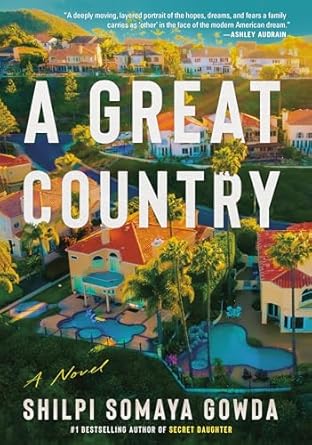4 Stars
This book asks about the possibility and price of the American dream.
Ashok and Priya Shah immigrated to the U.S. from India almost two decades earlier. By working hard, they’ve achieved success, having recently moved to an affluent gated community in southern California. Deepa, the eldest daughter, insists on staying at her old school with its multi-ethnic students, including her best friend Paco whose mother is undocumented. However, Maya, the middle child, loves her new school and strives to be accepted by her wealthy classmates.
One day, twelve-year-old Ajay, the youngest child, flies his homemade drone near an airport and is beaten and arrested as a terrorism suspect. Because he is on the autism spectrum, though not diagnosed, his reactions complicate the situation. As the Shahs struggle with the upheaval in their lives, the community at large becomes aware of Ajay’s arrest and the response is not always positive.
Multiple viewpoints are given. The perspectives of Ashok, Priya, Deepa, and Maya are included regularly so we get to know them really well and understand their actions. Ajay’s thoughts are also given occasionally, as are those of one of the arresting police officers.
The Shahs see themselves as model immigrants. Well-educated, they’ve worked hard and become upstanding citizens: “they were a law-abiding, tax-paying family who had followed every single rule since arriving in the country with a proper visa and legal invitation to come.” Despite their success and efforts not to draw attention to themselves, they encounter prejudice. Ashok thinks about India “where the complex strictures of caste, privilege, and socioeconomic class were [difficult] to escape,” but he realizes he has exchanged these constraints “for the new challenges of being a visible minority and an obvious foreigner.” He concludes, “America had its own version of a caste system – some visible minorities were on the bottom, hampered by discrimination and historical disadvantages, a constant headwind against their efforts.”
So the novel questions whether it is possible for immigrants to achieve the American dream: “Is America truly a country where people can come from around the world to seek their version of the American dream, or a place where ancient biases and discrimination continue to reign?” The Shahs belong to a “model minority” considered “smart and knowledgeable” and they have “managed to ascend to a higher rung,” but events show that they are not totally accepted. It’s as if the message is “thus far and no further.”
Of course, there are also questions about the meaning of success. Ashok in particular thinks in terms of economic success, but he and Priya come to realize that material trappings do not guarantee happiness. The family receives more support from outsiders and the middle-class community in which they lived previously.
One aspect of the book that bothered me is that it borders on being didactic. Some of the conversations so obviously touch on topics like immigration and racism: “’When a community starts becoming successful, that is when the backlash starts.’” Then there are statements like, “A country whose global advantage was its diversity born of immigration was turning its back on what had made it great.” And a character’s thoughts become a history lesson: “[Deepa’s] parents didn’t bother trying to see what life was like for Black people in this country, to understand the legacy of slavery and how it had reverberated through centuries of life in America: Jim Crow, voter suppression, redlined districts, underfunded public schools. Entire communities had been neglected when it came to infrastructure, from safe drinking water to access to fresh food and health care.”
Touching on themes of immigration, community, social class, stereotyping, racial profiling, white privilege, upward mobility, and generational conflict, this is a timely book with an important message.
Note: I received a digital galley from publishers via NetGalley.

No comments:
Post a Comment